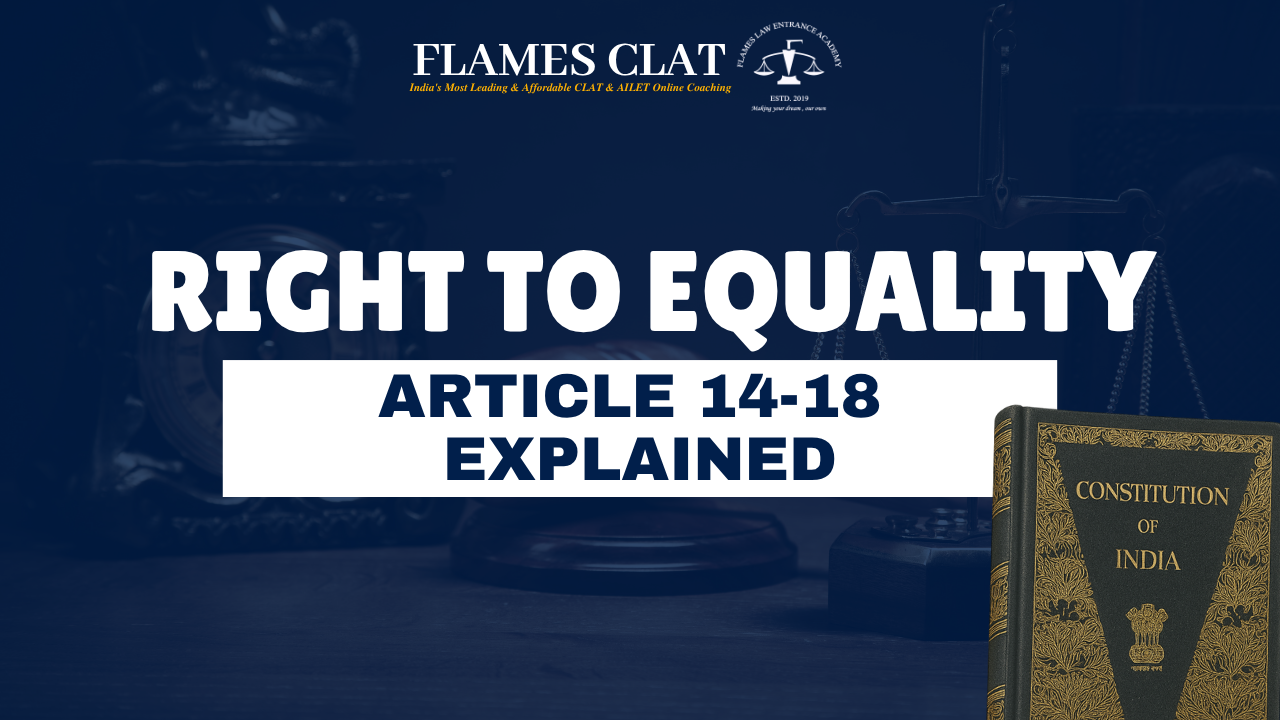Right to Equality: Art 14-18 Explained
In India, the Right to Equality is one of the most important fundamental rights. It is found in Articles 14 to 18 of the Constitution. These articles ensure that everyone gets fair treatment, equal chances, and protection under the law, without discrimination based on religion, race, caste, sex, place of birth, or similar factors.
The Right to Equality is a key part of the Indian Constitution and is often tested in law exams like CLAT (Common Law Admission Test), AILET and Judiciary Exams. It is one of the topics under Flames CLAT, which stands for Fundamental Rights, Legal Maxims, Articles, Major Judgments, and Emerging Laws as a helpful method students use to prepare for legal reasoning.
Article 14: Equality Before the Law and Equal Protection
Article 14 says the State can’t deny “equality before the law” or “equal protection of the laws” to anyone in India.
- Equality before the law means all individuals are subject to the same laws and no one is above the law.
- Equal protection of law means focuses on ensuring that individuals in similar situations are treated alike and that reasonable classifications can be made to address inequalities.
You can not have arbitrary laws that apply only to certain people. Lawmakers can classify people, but that classification must be based on clear differences and must have a logical reason behind it. If a law treats people differently without justification, it is unfair and against Article 14.
Article 15: No Discrimination
Article 15 focuses on banning discrimination. It says the State cannot treat any citizen unfairly based on religion, race, caste, sex, or where they were born.
This applies to public places like shops, restaurants, buses, no one can be turned away just for who they are.
India’s courts have strengthened this article over time. For example, in Air India v. Nergesh Meerza, the Supreme Court struck down rules that forced female flight attendants to retire early because of marriage or pregnancy as gender discrimination.
Another important case was Naz Foundation v. Govt. of NCT of Delhi, where the Delhi High Court said Section 377 (which criminalized gay sex) violated Articles 14 and 15 as it was an unfair and unjust law targeting a group without reason.
Article 16: Equality in Public Employment
Article 16 ensures equal chance for public jobs. The State cannot refuse employment based on religion, caste, sex, birth, or residence.
However, the same article allows the government to create reservations for underrepresented groups, like Scheduled Castes, for fair representation.
Article 17: Abolition of Untouchability
Article 17 bans untouchability. It is a serious social evil tied to caste systems. This article makes all forms of untouchability illegal and punishable by law.
To enforce this, Parliament passed the Protection of Civil Rights Act in 1955, making it a crime to refuse services or entry based on untouchability.
Article 18: Abolition of Titles
Article 18 prohibits the State and individuals from giving or accepting titles that suggest privilege or nobility, except for academic or military honors like “Doctor” or “Brigadier”.
This helps keep India’s society free from distinctions of nobility or honor based on social status.
Why the Right to Equality Matters
- It supports the Rule of Law, meaning no one is above the law, and everyone is subject to the same legal protections.
- It protects against arbitrary power, no one should be ruled by unfair or unexplained decisions.
- It strengthens social justice, ensuring marginalized groups can access the same chances as everyone else.
- It pushes India toward a fair and equal society, which was needed after years of caste oppression, untouchability, and social exclusion.
Important Court Cases
- Ram Krishna Dalmia v. Justice S.R. Tendolkar highlighted that classifying people must be logical and justified, not arbitrary.
- Visakha v. State of Rajasthan established sexual harassment as a violation of Article 14 rights.
- NALSA v. Union of India recognized a “third gender,” extending equal rights and dignity to transgender individuals.
- Shayara Bano v. Union of India (Triple Talaq) declared this practice unconstitutional, saying it violated Article 14 and 15 equality guarantees.
- Union of India v. Ld. Cdr. Annie Nagaraja and The Secretary, Ministry of Defence v. Babita Puniya awarded permanent commission to women in armed forces, rejecting gender-based assumptions about women’s roles.
Conclusion
The Right to Equality is a key principle in India’s Constitution. It covers fair treatment, banning of prejudice, equal chances at work, ending caste-based wrongs, and removing social titles.
Through Articles 14–18, India aims to ensure that all people, no matter their identity or background, can live with dignity, fairness, and equal respect under the law.
These type of Legal Debates and discussions have been a part of Flames CLAT Classes, which not only enrich student’s knowledge but also help them develop their cognitive skills.
Join our Flames CLAT Family at https://t.me/flamesclat
For Informative videos, do check out https://youtube.com/@flamesclat?si=-PqiaRLEjutM-iYj




Write a Review
Your email address will not be published. Required fields are marked *